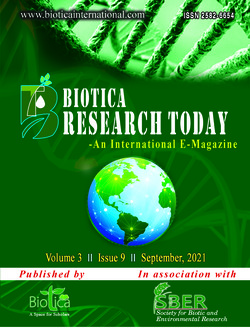
Molecular Markers and Their Applications in Cattle Genetic Research
V.B. Raghavendran*
Dept. of Agronomy, V&AS, ADAC&RI, TNAU, Trichy, Tamil Nadu (620 027), India
S. Saravanan
Dept. of Biotechnology, V&AS, AC&RI, TNAU, Madurai, Tamil Nadu (625 104), India
DOI: NIL
Keywords: Molecular markers, Production, Reproduction traits, Selection
Abstract
Recent developments in the fields of molecular biology and molecular technology involve the use of genetic markers for the improvement of production traits holistically. This takes into consideration most of the factors that may affect the breeding program. In biotechnological language, a molecular marker is a DNA fragment in association with a certain location in the genome and can also be called a genetic marker; the marker is used in identifying partial DNA sequence in an unknown DNA pool. A variety of genetic hybridization based markers have been used widely. The major challenge that faces molecular geneticists is to identify markers for genes that control the phenotypic variation in the target traits. The present review deals with the various molecular markers and the role played by them in: the selection of traits as well as animals for better productivity; disease resistant breeding; conservation and biodiversity; and geographical distribution of cattle breeds.
Downloads
not found
Reference
Deb, R., Sajjanar, Basavaraj, Singh, Umesh, Kumar, Sushil, Singh, Rani, Sengar, G., Sharma, Arjava, 2014. Effect of heat stress on the expression profile of Hsp90 among Sahiwal (Bos indicus) and Frieswal (Bos indicus × Bos taurus) breed of cattle: a comparative study. Gene 536, 435-440.
Naqvi, A.N., 2007. Application of molecular genetic technologies in livestock production. Adv Biol Res 1, 72-84.
Yang, L., Fu, S., Khan, M.A., Zeng, W., Fu, J., 2013. Molecular cloning and development of RAPD-SCAR markers for Dimocarpus longan variety authentication. Springer Plus 2, 501.
